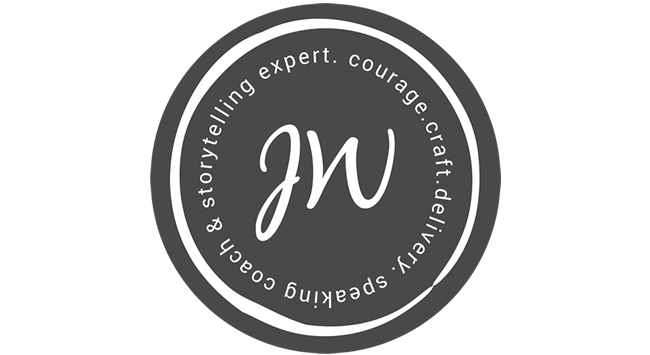How to stop saying UM once and for all!
June 21st, 2018

Are you an ummer? Or is “ah” and “uh” more your style? How bout “so” and “and?” Do you want to stop saying “um” once and for all?
First, a quick story. When I was in middle school, I was at a church youth group meeting listening to one of the older girls gave a talk, sharing her older-girl wisdom with the younger girls. At the end of her talk I raised my hand and said, “You said ‘y’know’ 36 times.”
I guess I got started early as a public speaking coach. 🙂
When I first hung my shingle as a grown-up public speaking coach, I thought, “Yeah…. whatever. A few ums is no big deal. I’ve got bigger fish to fry. It’s more about the heart of your message, the story you tell, how you show up, and the connections you make with the people in your audience.”
And true, it is.
BUT the ums (and ahs and uhs….and sos and ands and y’knows and likes and all those other sounds & words we use to fill the gaps) are major impediments to connecting with your audience. To getting your message across. To staying fully present in the room as a powerful, impactful speaker.
If your speaking is sprinkled with filler words, your audience has to do the work of filtering through those fillers to get to your message.
We’ve been working on THE UM THING in recent sessions of Speaker’s Playground. What I’m learning more and more is that doing this work touches on all aspects of becoming a more powerful public speaker.
When you stop saying um, it allows the audience more space to actually hear your message and integrate what you’ve said.
Your presence becomes stronger and clearer when you let all the fillers go by the wayside. Then YOU become the powerhouse in the room, and everyone leans in to hear what you have to say.
(I’m using um to stand for all filler words, so if um isn’t your thing, but starting sentences with so or and is, then stay with me!)
OK but how do you stop using filler words anyway?!
Here’s how:
STEP 1. BE AWARE
Being blissfully unaware might work for a little while, but once you start finding ways to eradicate the ums, you’ll see how powerful your speech can be without them.
After blissfully unaware comes ridiculously-stilted, self-conscious, stumbling awareness, where the only thing your brain sees is that big glaring UM that you’re trying so hard not to say.
Which means it’s possible that paying attention might even make you start saying more ums at first. Yuck. Who wants that?
But if you stay through the self-conscious phase (where you’re thinking about it constantly and it’s driving you mad) you will find yourself on the other side in the integration phase.
In the integration phase, the new groove in your brain has been formed and ums don’t slip in. Or at least you have enough agency and awareness to make a different choice when they try to slip in.
So find a way to track your ums. Ask a friend to be your “um-dinger” next time you give a talk. Turn on your phone and record yourself speaking. Watch a video of yourself speaking.
You might not realize how many filler words you’re using. Once you start noticing, rather than um-bashing yourself, celebrate that you’re now aware, and start working to create space for a pause instead of an um!
STEP 2. SLOOOOOOW DOOOOOOWN
Waaaaay down. Go slow enough to catch the ums. Slow enough so your words aren’t pouring out of your mouth faster than your brain is thinking. Slow enough to make a different choice when you feel the um coming.
It’s ok to pause. It’s ok to take a moment and think about what you’re going to say next. (Check out another post THE POWER OF THE PAUSE, and all the different ways to integrate pauses into your speaking)
Your brain might get tripped up here. When you feel the um coming, you might pause, and then all your brain can see is that glaring um that it’s trying so hard not to say.
That’s ok. Just hang there for a minute. The um will dissolve and you’ll get back to your message, even more clearly, even more powerfully, with you even more fully in the room.
Just. Slow. Down.
STEP 3: RISK CONNECTION
One of the things we discovered in Speaker’s Playground recently is that in that space where the um isn’t happening, there’s room for connection, for my humanity to touch yours.
Which can feel mightily uncomfortable. At the same time that it’s exactly what we’re after when we’re speaking, right?
I know pausing can be one of the scariest things on the planet. A pause means you have to actually be present with yourself and your audience and potentially feel whatever fear or discomfort you might be having inside.
But the pause is where it’s at.
If you’re not saying um, you’re bringing yourself into more mindful presence. You might find yourself in a state of “I don’t know.” You might feel a little lost for a moment.
And who’s there to find you but your audience!
So when you have that impulse to push away the discomfort, close the gap, run away and say UM, hang right there, with the discomfort of not knowing, of actually sensing and allowing what’s happening in your body, slowing down enough to breathe, noticing your audience is there to be with you.
Yikes, indeed. But that’s exactly when real connection happens. And is way more satisfying and fun than saying um. 🙂
STEP 4. WORK THAT MUSCLE!
Eradicating the ums is a practice. By paying attention to it, you will strengthen that muscle and create a new pathway, a new groove.
A concert pianist practices scales over and over, but when she gets on stage, she is connected to the heart of the music, to her audience, to the magic of what’s inside the music. She’s not thinking about scales. But you better believe she’s done them.
Doing um-dinger practice is like doing scales. Or lifting weights. Or running hill sprints. It is a muscle that takes focus and attention to strengthen. It can be hard work. And it’s totally worth it. (Want practice support? Come join us in The Speaker’s Playground!)
The more you bring your awareness to it, the more you work that muscle, the more easeful it will become to catch those fillers and make a different choice right there in the moment of speaking, bringing more of your powerful presence to the stage.
Have fun, and let me know how it goes!
One response to “How to stop saying UM once and for all!”
Leave a Reply
« Your story matters! | Pause… and let everyone know you’re in charge »


 FACEBOOK
FACEBOOK INSTAGRAM
INSTAGRAM LINKEDIN
LINKEDIN SUBSCRIBE
SUBSCRIBE
I love this. I’m a “liker” more than an “ummer,” particularly when I’m improvising.